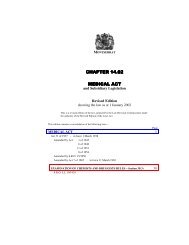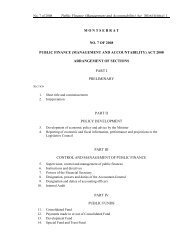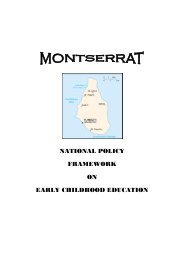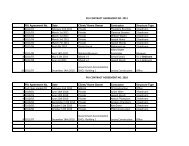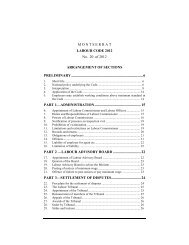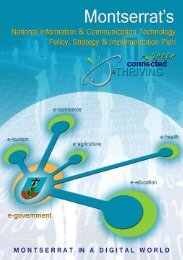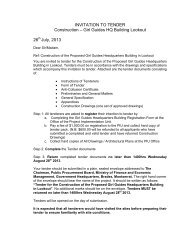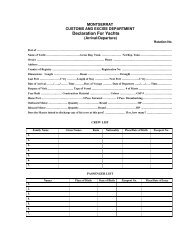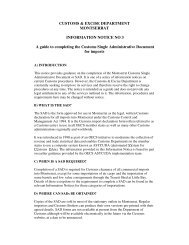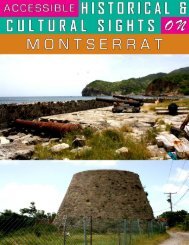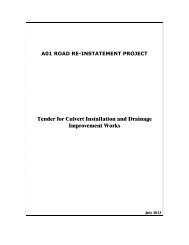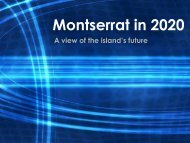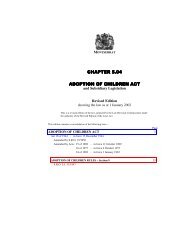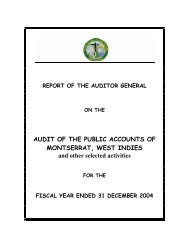<strong>Montserrat</strong> <strong>Survey</strong> <strong>of</strong> <strong>Living</strong> <strong>Conditions</strong><strong>Executive</strong> <strong>Summary</strong>“Because parents have to work two or more jobs to make ends meet, there is no more interaction betweenparents and children. Children are not monitored properly by their parents and do not go home after schoolwhich may be a cause <strong>of</strong> delinquency”. (FGD Salem)The traditional form <strong>of</strong> support for the elderly is by family members. This type <strong>of</strong> support is in declineworldwide and, on <strong>Montserrat</strong>, has been accelerated by the volcanic eruption, which eliminated many <strong>of</strong>savings and assets as well as leading to family fragmentation. The elderly are thus increasingly dependenton pensions and social welfare - the majority <strong>of</strong> households with elderly persons have income from thesesources. Their prime concerns are thus different from those <strong>of</strong> other vulnerable groups: the low level <strong>of</strong>welfare/ pension payments, loneliness due to the absence <strong>of</strong> family members, access to health services,both <strong>of</strong> which can be compounded when mobility is impaired. These non-income issues can affect notpoor as well as poor elderly persons 12 .The economic downturn and the high prices have affected many migrants on the island in similar ways tonationals: increased unemployment, reduced working hours and increased pressure, sometimes intense, onhousehold budgets. For poor and less skilled migrants, the major issues <strong>of</strong> concern are those related toimmigration and work permits (the actual regulations and their application), differential access to healthcare and a sense <strong>of</strong> insecurity and vulnerability arising from their perception that their presence is resentedby many <strong>Montserrat</strong>ian. Conversely, there is a perception amongst some <strong>Montserrat</strong>ians that migrants aretaking their jobs 13 . There is thus a palpable sense <strong>of</strong> mutual distrust between migrants and <strong>Montserrat</strong>ians.Housing is mentioned over 60 times in the FGDs and KIIs, and particularly by the households relocatedfrom the devastated area, many <strong>of</strong> whom are living in rented property or shelters, and who are unable toaccess the funds needed to buy or build a new house <strong>of</strong> their own. Debt to foreign banks for mortgageson properties lost under the eruption remains a hindrance to some, as well as being an impediment to thereturn <strong>of</strong> non-resident <strong>Montserrat</strong>ians. The accommodation for poorer renting households is <strong>of</strong>ten lowstandard, overcrowded and inadequately maintained. At the same time, northern residents are critical thatvirtually all housing assistance has gone to relocatees and almost none to them, despite the fact that manylost their jobs with the eruption.On the other hand, non-financial issues related to infrastructure (e.g. water, electricity or roads) oreducation received substantially fewer mentions.There is fairly widespread criticism <strong>of</strong> the government’s performance, although some say that the GoM isdoing what it can but is constrained by outside factors, namely the macro-economy and the financialcontrol exerted by the UK government. These criticisms range from the failure to impose price controls orreduce taxes to a perception that the administration does not ‘care’ for the needy or listen enough to theirviews, and more seriously, a perception that the government is only looking after its own, e.g. throughfavouritism in the allocation <strong>of</strong> housing and jobs, protected pensions, as well as unrealised electionpromises. None <strong>of</strong> these occurs frequently in the PPAs but the overall impression <strong>of</strong> a lack <strong>of</strong> trust ispervasive as is a belief that the government holds the key to their future wellbeing.12 The quality and accessibility <strong>of</strong> health care is also the greatest concern <strong>of</strong> the physically and mentally-challenged.13 “We are double dying – people leaving and non-nationals are taking jobs” (Salem FGD).<strong>Montserrat</strong> Country Poverty Assessment, Final ReportHalcrow Group Limited, July 2012.ES12
<strong>Montserrat</strong> <strong>Survey</strong> <strong>of</strong> <strong>Living</strong> <strong>Conditions</strong><strong>Executive</strong> <strong>Summary</strong>3.5 Coping StrategiesInadequate incomes whether due to low wages, unemployment, insufficient government assistance or lack<strong>of</strong> family support for those too old, too young or too disabled to work, necessitates the adoption <strong>of</strong>coping strategies. The main coping strategies identified during the study are shown in Table ES4. Ingeneral, these vary little between different groups; nor are they very different from those found in mostCaribbean poverty assessments.Table ES4: Coping StrategiesCopingStrategyBackyardgardeningSecondoccupationsReduced foodconsumptionReducingexpendituresespeciallyutilitiesFamilyassistance /remittancesGettingassistancefrom NGOsUsing savings/ selling assetsKIIs/ FGDsmentioningWho doesit?65% Those withland/ gardens44% The ablebodied.CommentsHas always existed but <strong>of</strong>ten hampered by poor soil and looseanimals and pests (iguanas) which destroy the crops.Includes renting rooms, both parents seeking jobs; cash-in-handjobs such as ironing, gardening, cleaning, etc.35% All Eating less; buying food on a ration basis or wholesale; usingstaples only; foraging. Leads to less nutritious diets and,infrequently, hunger.25% All those notin sheltersSee data above. Manifestations include using less light,purchasing energy saving light bulbs, cooking less, maximisingwash loads, minimizing water use, no longer using electric stoves,coal pot cooking*; walking rather than taking the bus; reducedsocial activities. By far the most prevalent is delaying payments.49% All Little evidence that remittances are having a significant onreducing poverty: under 6% <strong>of</strong> households received overseasremittances and in virtually all cases, these did not affect thepoverty status <strong>of</strong> the household. Net remittances are negative asNNATs remit more overseas than are received on the island.NaProstitution 3mentionsMostly theelderly andthe disabledNa All Rarely mentioned.Young womenPrincipally the Red Cross and churches but also Meals on Wheels(68 total mentions in all PPAs). Assistance is mainly in food. Bothorganisations rely on donations for the assistance they provide.One <strong>of</strong> the most extreme and infrequent.Emigration Na All More close family members had left the island than had arrived inthe last 5 years. This was also the primary coping strategyfollowing the eruptions.3.6 Priority NeedsThe PPAs also obtained information on residents’ views as to their priority needs. Figure 3.7 shows thedifferent patterns <strong>of</strong> policy suggestions obtained from the KIIs/ FGDs, which can be expected to takemore <strong>of</strong> an overview <strong>of</strong> the overall situation and the SSIs which are more likely to reflect the concerns <strong>of</strong>individual households. While the Figure shows broadly similar patterns with similar, and greatest, emphasison economic issues, the SSIs give greater relative importance to health, migration and governance issues.In contrast, the KIIs/ FGDs put more emphasis on agriculture, recreation facilities and infrastructure/major projects.The PPAs also provided a substantial number or more detailed suggestions, many <strong>of</strong> which have beenincorporated into the Poverty Action Programme (see section 6 below).<strong>Montserrat</strong> Country Poverty Assessment, Final ReportHalcrow Group Limited, July 2012.ES13



